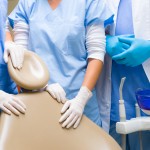
Access to oral health care is difficult in many parts of the world. One way of improving this is by delegating tasks traditionally undertaken by dentists to other members of the dental team. The question addressed by this review by Wright et al was: –
In populations where non-dentists conduct diagnostic, treatment planning, and/or irreversible/surgical dental procedures, is there a change in disease increment, untreated dental disease, and/or cost-effectiveness of dental care?
The review team searched the Medline, Embase, CINAHL, LILACS, Cochrane Database of Systematic Reviews, OpenGrey (System for Information on Grey Literature in Europe [SIGLE]-based), Scirus, Science.gov, Cost-Effective Analysis (CEA) Registry, European Network of Health Economics Evaluation Databases (EURON-HEED), ClinicalTrials.gov and Health Services Research Projects in Progress (HSRProj) databases. They also contacted 20 separate organisations. A broad range of study designs was included. The main outcome of interest was disease increment of severity with studies related to technical quality and patient satisfaction being excluded. The quality and risk of bias was assessed.
Eighteen studies were included these were conducted in Australia, Canada, Hong Kong, New Zealand and the United States. They all related to dental caries. Only studies involving dental nurses and therapists met the inclusion criteria. Thirteen of the studies were judges to be at high risk of bias, five at moderate risk and one at low risk.
The authors concluded
The quality of the evidence was poor.
In select groups that received irreversible dental treatment by teams that included mid- level providers, caries increment and severity decreased across time. However, there was no difference in caries increment and severity compared with those in populations in which dentists provided all irreversible treatment.
In select groups that received irreversible dental treatment by teams that included mid- level providers, untreated caries decreased across time and untreated caries decreased compared with that in populations in which dentists provided all treatment.
We found no data in the following domains: diseases other than caries for which mid-level providers performed irreversible procedures; outcomes of interest for mid-level providers performing irreversible diagnostic procedures such as excisional biopsies for oral cancer; and cost effectiveness, defined as the real cost of reducing disease burden, of mid-level providers.
Comment
It is disappointing that there have been so few good quality studies addressing what is an important question. The previous review by Galloway et al in 2002 conducted in the UK also identified that the available evidence was not also poor but old and is seem that little has changed in the intervening 12 years. In recent years the number of dental therapist training has increased here in the UK yet we are still unclear of the best system in which to make best use of their skills and talents. A Cochrane review of the use of dental auxiliaries is currently underway (Dyer at al) this aims to
To assess the effectiveness of dental auxiliaries in providing care traditionally provided by dentists.
While the ongoing Cochrane review has a broader remit than this latest review by Wright, the Galloway review covered much this this broader ground in 2002 and found precious little good evidence so it will be interesting to read the findings of the Cochrane review in due course.
Links
Wright JT, Graham F, Hayes C, Ismail AI, Noraian KW, Weyant RJ, Tracy SL, Hanson NB, Frantsve-Hawley J. A systematic review of oral health outcomes produced by dental teams incorporating midlevel providers. J Am Dent Assoc. 2013 Jan;144(1):75-91. PubMed PMID: 23283929.
Galloway J, Gorham J, Lambert M, et al. The Professionals’ Complementary to Dentistry: A Systematic Review and Synthesis. University College London, Eastman Dental Hospital, Dental Team Studies Unit 2002:
Dyer T, Brocklehurst P, Glenny AM, Marshman Z, Davies L, Richards D, Newton T, Godson J, Tickle M, Lala R, Robinson PG. Dental auxiliaries for dental care (Protocol). Cochrane Database of Systematic Reviews 2012, Issue 9. Art. No.: CD010076. DOI: 10.1002/14651858.CD010076.
